- Home
- Jason Webster
Andalus Page 13
Andalus Read online
Page 13
‘Excuse me a moment,’ I said to Amadeo as I uncurled myself from the bench.
The toilets were in a corner of the hall, near the entrance to the garden section of the tablao. They said that even the great Camarón had performed here on occasion, which was probably why so many foreigners had homed in on the place. It was low season – autumn – yet the blond heads of several dozen Scandinavians and Northern Europeans punctuated the residually black and dark-brown patina all around us. Just outside the doorway a group of five American boys in their early twenties, pumped with Hemingway-esque bravado and sangría, were challenging one another to fist fights, their catcalling managing to rise above the Spanish din of several hundred voices all talking at once.
‘I could take you on right here and now, pal.’
‘You’re full of shit, Todd.’
You had to take your hat off to the Spanish at moments like these: rather than creeping away or stiffening in awkward English silence, they merely talked and laughed that bit louder, effectively blotting out the socially undesirable with their own noise.
‘Zine?’ I called at the one locked cubicle. The floor was covered in a grey-brown coating of well-trodden piss, cigarette butts making clean-sweeping streaks where people had slipped on them as they passed in and out. There was no response. I looked around to see if there was anyone who might have noticed something wrong. Two men stood with their backs to me at the urinals, concentrating on other matters in hand.
‘Zine!’ I knocked this time. ‘Anyone there?’
‘Looks like you might have a wait on your hands,’ one of the men said, zipping up his fly as he stepped past me back into the hall. I smiled, but a lump was starting to develop in my throat. If Zine was in there, perhaps I’d seriously underestimated how ill he was. Still smarting from Cordoba, I hadn’t been too keen to ask questions, hoping things would sort themselves out, my mind fixed on our eventual arrival in Niebla and the day when I could finally deliver on my promise and get him a job – and off my hands. But what if he’d fallen unconscious? With an inward groan I could see myself having to break down the door. Perhaps I could get the American kids to give me a hand. But it wasn’t easy breaking down doors without people noticing. I’d have to get the management involved, which meant ambulances, the police, paperwork – and the next boat back to Morocco.
‘Zine!’ I shouted this time, a note of desperation in my voice. There was a kick on the door from the inside.
‘Is that you, Zine?’ I said. A sign of life at least. ‘Zine?’ There was always the chance, of course, I was just annoying the hell out of some complete stranger quietly trying to have a late-night crap.
‘Jasie,’ came the weak reply, with a note of self-pity. But before I could say anything else the latch had been pulled back and a white-faced Zine had pulled me inside the cubicle with him, locking the door again as I tried to avoid getting too close to the well-used lavatory.
‘What’s going on?’ I said as he turned round again to face me. ‘Are you ill? You’ve been in here for ages.’ From the force with which he’d grabbed my shirt front, I sensed this was not as life-threateningly serious as I’d been starting to imagine.
‘Jasie …’ The skin around his eyes was swollen, there was a certain pallor around his cheeks, and a distinct wobble was developing in his chin.
‘What’s the matter, Zine?’ I put my hand on his shoulder to try to calm him down.
He looked at me, leaning his head towards mine with the expression of someone faced with a certain and violent death. ‘It’s red, Jasie. ¡Hmar!’ he screamed, a flood of moistened breath issuing from his mouth, and pointed down at the toilet bowl. After a moment’s hesitation, partly out of concern that my Moroccan companion had finally lost it, partly for fear of what I was about to set my eyes on, I turned and looked. The usual stains and griminess of a public convenience were there, as I had expected, but I was surprised to find that in addition there was a pinky hue to the water at the bottom.
‘Blood!’ Zine screamed again, and placed his head against my arm with a dramatic sob, his left hand placed over his groin in a protective gesture. ‘I’m going to die!’
I looked down again at the water in the bowl. The moment that every man secretly fears – when he sees the most treasured part of his anatomy spurt forth the wrong colour liquid – had just come for Zine. Yellow? Fine. White? Even better, at least in the right circumstances. But red? Ooh, that was a nasty one, tapping into primeval fears of blood, death and having your knob chopped off. And, rightly enough, Zine felt that his entire life had come to a sudden and horrific end.
‘Jasie, help me!’ His knees giving way, he hung on to me as though he was being dragged down into the icy pit of Hell itself.
‘Come with me,’ I said, pushing my arm under his shoulder to support his weight and slipping the catch on the door.
‘No!’ he screamed again. ‘Just let me die here.’
Ignoring his protests, I managed to get him out of the cubicle and back into the hall, his head bobbing up and down as though he’d just taken a bullet through the carotid artery. I half expected stretcher-bearers with little red crosses painted on their helmets to come rushing over and take him away to the nearest field hospital, but no-one paid us any attention. A group of people who looked like managers of the place were busy ushering the American youths away, their patience finally tested by their boisterous sabre-rattling, so I slipped over to their empty seats and sat Zine down.
‘Wait here,’ I said, trying to keep him from sliding to the floor. He gave me a half-conscious grunt of acknowledgement, quickly falling back into the role of dying victim.
‘Amadeo,’ I said, getting back to my seat, ‘you don’t know any clap clinics in Seville, do you?’
It was nine o’clock in the morning when we got to the centre on the Calle Baños. The place didn’t open till ten, but Zine wanted to be the first in line, convinced his only chance of cheating certain death would be to get whatever pills they gave him down his throat as fast as possible.
We arrived as the ghost-light of early morning was giving way to a muggy warmth that barely seemed to leave the city, no matter what time of year you came. July and August were the worst, when the temperature stayed at a steady forty plus. But even in winter you often saw girls in sleeveless dresses. The cooler months of the year were really the best times in places this far south: to compare someone to ‘a summer’s day’ was bordering on insult.
Despite our early arrival, a handful of girls, mostly black, were already hanging around outside the locked clinic doors. Their long, shapeless legs protruded from tiny leopard-skin skirts of varying shades – pink, brown, orange – and they leant against the wall with tired bodies. Each girl had her little handbag tucked under her elbow, and their eyes were half closed after being up all night. Astonishingly young, most of them; they looked barely fifteen or sixteen.
‘You’ll be all right there,’ Amadeo had said. ‘They’re used to dealing with putas so it’s all anonymous. No difficult questions.’
I hadn’t really expected him to have a clue about where Zine and I should go, merely asking him on the off-chance and as a way of filling him in on what had happened. But he’d given us the address straight away, as though, apart from being a flamenco guitarist, he also worked in his spare time as a counsellor for people with STDs.
‘Old girlfriend of mine used to work there,’ he said. Seemed plausible enough, and I wasn’t intending to ask anything more when he added that he met her there when he went for a check-up himself ‘after a mild touch of gonorrhoea’.
‘Right,’ I said, not really wanting to know this. ‘What was her name? Do you want me to say “hi”?’
‘Mati. She doesn’t work there any more.’
Good, I thought. Having a person on the inside of an organization usually helped smooth out most procedures in Spain, but in this case I was quite happy for there not to be any more personal contact than the bare minimum.
Zine sat
on the pavement, his head in his hands, moaning to himself in Arabic. He rocked from side to side like a child soothing himself. We’d only slept for a couple of hours back at the pensión before heading out again, Zine writhing like a madman on the bed while he kept one protecting hand over his crotch, refusing to undress or wash or, heaven forbid, go to the toilet again. I hoped that with the sweat and dehydration he wouldn’t have to piss, but several hours had passed now since I’d dragged him out of the tablao and I hated to think what kind of pressure his bladder might be under.
‘Don’t worry too much about him,’ Amadeo had said as we left Carboneras. ‘It’s nothing. Just shock. They’ll just give him some antibiotics, it’ll burn when he pisses for a while, but he’ll be right as rain in a few days. It’s who he got it from and who he’s given it to that you’ve got to worry about.’
And it was this more than anything else that had been passing through my mind all morning. It might have been useful to find out from Amadeo how he had dealt with the situation back when he met Mati, but he would already be halfway to Madrid by now, having caught the seven-thirty Ave train. I thought back to the girls Zine had slept with since we’d been on the road – or at least the ones I was aware of. Was there any way we could get in touch with them? Or would it even be necessary? I wasn’t sure how long the incubation period for gonorrhoea was. Would Lucía be at risk?
At five past ten, the doors to the clinic finally opened. From his slumped position on the floor, Zine leapt up and pushed his way to the front, ahead of the prostitutes, and spoke nervously and rapidly to the woman letting them in.
‘Concha at the desk there will take your details,’ she said, stifling a morning yawn and pointing behind her, a lifetime of dealing with genital warts and HIV making her blasé about just another simple case of the clap.
I stood out in the corridor reading the sexual-health notices pinned on the walls as they dealt with Zine in one of the consulting rooms: ‘ITCHING?’. Most of the prostitutes seemed like regulars and were dealt with speedily by the people on duty, picking up condoms or what looked in some cases like bags of prescription drugs. A couple, though, had stayed on, their heads lurching forward as they drifted off to sleep then woke with a start to exchange brief words with each other. For a moment I thought I caught some English, but wasn’t sure. Many of the girls had what looked like ritual scars running down their cheeks, like thick strokes of a brush dipped in deep-purple paint.
‘Did you want to speak with someone?’ the girl at the desk asked.
‘No, thanks. I’m here with a friend,’ I said, and laughed as I found myself using the clichéd line.
‘Tell me,’ I said, taking a step closer, ‘how serious is gonorrhoea?’
Ten minutes later, Zine stepped out with a bunch of leaflets, a look of utter seriousness on his face which told me immediately that the worst had failed to happen and the crisis was now at an end. The health worker had told me that the first symptoms usually developed two to five days after contact, which at least meant that Lucía was almost certainly all right, and had confirmed Amadeo’s assurance that it could be dealt with by a single dose of antibiotics.
He’d probably caught it from the girl in Granada. The only problem now would be seeing how he dealt with having lost face so dramatically the night before. He walked past me with a grunt and headed for the door.
‘Disculpe,’ said a woman’s voice behind me. I turned and then called to Zine.
‘No,’ said the doctor – a small woman with thin dark eyes and tightly knit curly hair. Better suited to a police uniform than a white coat, I thought. ‘I want to talk to you.’
I stopped. God forbid that she was going to ask for papers. What with the new law on foreigners, things had tightened up. Maybe they did want to take down our details. But then why had she called to speak to me? I took a hesitant step towards her.
‘Mamada – Blowjob,’ she said curtly when I’d got closer.
I did a double take.
‘Mamada,’ she said again. ‘You understand Spanish, don’t you?’
‘Yes, all too well.’
‘I need you to give me the English translation. I take it you’re English, or American?’
I nodded.
‘It’s these Nigerian sex workers,’ she said, indicating over my shoulder at the prostitutes in the corridor. ‘They don’t speak any Spanish and we’re trying to educate them about high-risk sex activities, but of course all our English is medical, from the textbooks. They don’t understand me when I say “fellation”.’
‘No, of course. I quite understand,’ I said.
‘Or anal intercourse. It’s ridiculous, we end up saying things like “up the front” or “up the back”. I need you to tell me the slang terms. Then they’ll know what we mean.’
‘Well, you’re not doing too badly,’ I said, not quite sure how much time she had. This could end up being either a very long or a very short English lesson, but certainly unlike any other I’d given before. I could see from her expression, though, that it was important to her, so I pulled out my notebook and began writing what seemed likely to be the most common phrases, hoping that straightforward Anglo-Saxon would do the job.
‘Suck,’ the doctor said slowly as she watched me scribble. ‘Cock.’
‘That’s a verb,’ I said. ‘This one’s a noun.’
The obvious thing would have been to have talked to the Nigerians themselves and asked what terms they used, but it was early in the morning, Zine was waiting outside and I’d barely slept all night. The last thing I wanted was for them to think I was touting for business.
‘Here,’ I said, passing the piece of paper over when I’d finished. We went over the pronunciation for a few minutes while she took some notes, before I finally made my excuses.
‘This is very, very helpful,’ she said with a broad smile, teeth stained with tobacco. ‘We are trying to control disease here, but it is impossible if we cannot communicate with the girls. Thank you, thank you. Wonderful.’
And she looked down at the paper once again as I turned to leave, a silent but unmistakable mouthing of ‘handjob’ on her lips.
TARIFA
We reached Tarifa at dawn. I woke Zine with a nudge as a pink-grey light lifted from the sea, catching the tops of the hills then gradually working its way down the slopes. It was like watching a match burst into flame in slow motion. The towering mills of wind farms spread over the hillsides spun slowly and effortlessly, facing the wet south-west. Things were much greener here than I’d expected. We were considerably further south than the arid desert of Almería to the east, yet the pastoral scene reminded me of a sunnier version of Ireland, with rounded, treeless fields of grass, the occasional cow and an ever-present wind blowing off the Atlantic. To the west you could see what looked like rain clouds forming in the Bay of Cádiz.
When I first saw Africa I was convinced that my bearings had somehow got confused and I’d caught sight of some mountain range further towards Algeciras: the sea wasn’t visible yet, and what I later realized to be Jabal Musa looked like an extension of the Spanish mainland, so close did it seem.
‘Al-Maghrib,’ Zine said dreamily. ‘Morocco.’
Only when we got further down, and the silver-shifting seas came into view, did I recognize where we were. A whole massive, majestic continent stood before us like a magical world, as close and as distant as the cloud cities dreamt up in a child’s imagination. You wanted immediately to reach out to it, to stretch out your hand and touch the untouchable, to cross this mirror-like barrier and enter into its different space. It seemed unnatural that there should be any division at all here, unnatural that either of us might belong or be rejected simply for being on one side or the other. This was a crossing-point, a gateway for both north and south and East and West, a geographical crossroads; not a wall for keeping people in or out. It was where the Islamic world had first touched Europe, where Tariq had brought his army of Arabs and Berbers: the birthplace of Al-Andalus.
Landing in the spring of 711, Tariq had touched down at Gibraltar – jabal Tariq – before establishing his base across the bay on what he described as the ‘green island’, al-jazira al-khadra, today known as Algeciras. Five years later, the Muslims had conquered almost the entire peninsula, something the Romans had taken two centuries to achieve. And although there were no Muslims ruling here now, you could detect signs of their former presence in the white cubic houses of the villages, or dark Semitic faces, speaking a Latin tongue laced with words retained from when Arabic had been the spoken language here.
Tariq’s invasion had not been the last southern force to cross the Strait: Berber armies of the Sahara had followed in his wake – Almoravids in the eleventh century, Almohads in the twelfth. They said that cannon had been used in Europe for the first time at Algeciras in 1340, when Alfonso XI had besieged the Moorish-held city – although the technical innovation came from the defenders, not the attackers. Chaucer was to claim a role for his Knight in the successful siege.
Later, the invasions went in the opposite direction: the Portuguese in the fifteenth century, then the Spanish, claiming large parts of northern Morocco. To this day they still hold Ceuta, the southern sister of Gibraltar: an enclave of Christian Europe on the very tip of Africa.
More recently, the movement of peoples and conquest had pointed northwards once more: Franco had launched his ultimately successful assault on the Spanish mainland from the Moroccan side of the Strait in 1936, using, in typically paradoxical Spanish fashion, Moorish troops in his ‘crusade’ against the atheist Reds. While today, a largely invisible tide of immigrants was silently and secretly making its way over, risking everything in tiny overcrowded fishing boats to cross the deceptive waters and search for a better life in the prosperous north. I had one of them next to me in the car now.

 Violencia
Violencia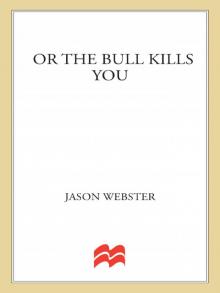 Or the Bull Kills You
Or the Bull Kills You The Killing of El Niño Jesús
The Killing of El Niño Jesús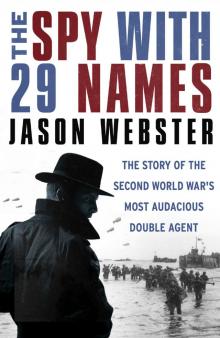 The Spy with 29 Names
The Spy with 29 Names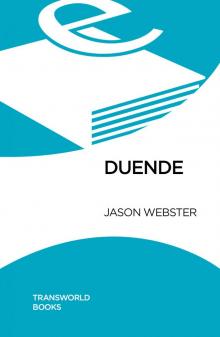 Duende
Duende Guerra
Guerra Sacred Sierra
Sacred Sierra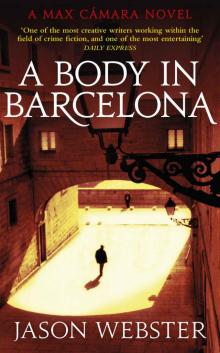 A Body in Barcelona: Max Cámara 5
A Body in Barcelona: Max Cámara 5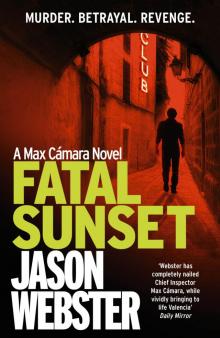 Fatal Sunset
Fatal Sunset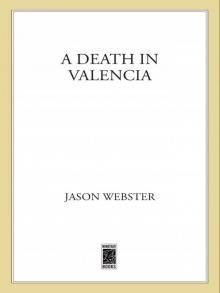 A Death in Valencia
A Death in Valencia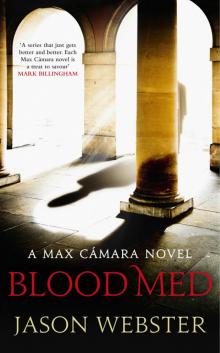 Blood Med
Blood Med Andalus
Andalus